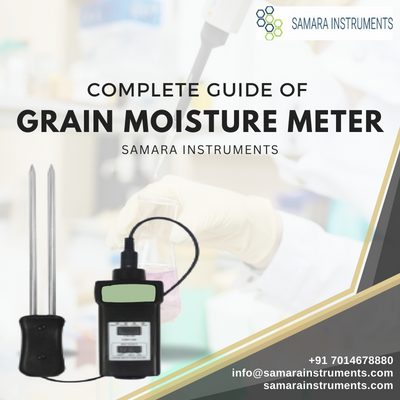Explore Moisture Meters for Grains or Grain Moisture Meters
Grain moisture meters often referred to as “moisture meters for grains,” are indispensable tools for professionals in the agriculture and food processing industries. These devices play a crucial role in ensuring the quality and safety of grains by measuring their moisture content accurately. In this article, we will delve into the importance of grain moisture meters, their applications, and key considerations when choosing the right one for your needs.
Understanding Grain Moisture Measurement
Grain moisture content is a critical factor that affects the quality and shelf life of grains, as well as the efficiency of various processes in the agricultural and food industries. Measuring moisture levels accurately is vital for several reasons:
- Quality Control: Maintaining the right moisture content is essential to prevent spoilage, mold growth, and insect infestations in stored grains.
- Harvest Timing: Knowing the moisture content of crops helps farmers determine the optimal time for harvesting, ensuring the best possible quality.
- Food Safety: Grain moisture meters are instrumental in verifying that grains meet safety standards, reducing the risk of contamination and ensuring food safety.
Applications of Grain Moisture Meters
Grain moisture meters find applications across various sectors:
- Agriculture: Farmers use these meters to determine when to harvest, store, or sell their grains to maximize yields and profits.
- Food Processing: Food manufacturers rely on moisture meters to maintain consistent product quality and safety during production.
- Grain Storage: Grain moisture meters help storage facilities monitor moisture levels to prevent spoilage and ensure long-term grain quality.
- Research: Researchers use grain moisture meters for studies on crop development, breeding, and post-harvest handling.
Choosing the Right Grain Moisture Meter
Selecting the appropriate moisture meter for your specific needs is crucial. Consider the following factors:
- Grain Type: Ensure that the meter is suitable for the type of grain you are working with, as moisture levels can vary significantly between different grains.
- Accuracy: Look for a moisture meter with high accuracy to make precise measurements.
- Portability: Depending on your requirements, you may need a portable or handheld meter for on-site testing.
- Data Storage: Some meters offer data storage capabilities, which can be valuable for record-keeping and analysis.
- Calibration: Check if the meter requires regular calibration to maintain accuracy and reliability.
Additional Facts About Grain Moisture Meters
- Grain moisture meters come in a variety of types and technologies, including:
- Electrical conductivity meters
- Capacitance meters
- Infrared meters
- Grain moisture meters can be used to measure the moisture content of whole grains, ground grains, and grain products.
- Some grain moisture meters also offer additional features, such as:
- Temperature measurement
- Data logging and storage
- Connectivity
- It is important to properly calibrate your grain moisture meter on a regular basis to ensure accurate readings.
Benefits of Using Grain Moisture Meters in Agriculture
- Improved crop yields
- Reduced post-harvest losses
- Enhanced food safety
- Increased efficiency and profitability
Use of Grain Moisture Meters in Food Industry & Agriculture
- Food processing plants: Grain moisture meters are used to check the moisture content of incoming grain shipments and to monitor the moisture content of grain during processing.
- Grain elevators: Grain moisture meters are used to check the moisture content of grain shipments and to store grain at the correct moisture level.
- Farmers: Grain moisture meters are used to determine when grains are ready to be harvested and to monitor the drying process of grains.
- Animal feed mills: Grain moisture meters are used to ensure that the moisture content of animal feed is within the correct range.
- Ethanol plants: Grain moisture meters are used to check the moisture content of corn before it is milled into ethanol.
Conclusion
Grain moisture meters are essential tools for professionals in the agriculture and food processing industries. By accurately measuring moisture content, these devices contribute to maintaining grain quality, ensuring food safety, and optimizing production processes. When choosing a grain moisture meter, consider factors such as grain type, accuracy, portability, data storage, and calibration requirements to make an informed decision.
Investing in a high-quality grain moisture meter is an investment in the quality and safety of your grains and products, ultimately benefiting your business and your customers.
To purchase this product you connect with us over whatsapp


